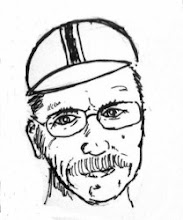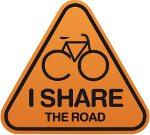On the SIR List on of the newer members of the Seattle International Randonneurs was concerned about her average riding speed on brevets and asked:
Does anybody have any tips on getting faster? Right now I kind of feel like I'm not really progressing much. Any tips or feedback would be greatly appreciated! Thanks so much!
Various folks posted a range of good advice. My contribution to the thread (slightly edited to allow for the lack of context here) was this:
You do have more options [on a brevet] if you can learn to go faster, so here are some thoughts about that.
My main approach is not to worry about going fast, I worry about not going slow. These are two different things. For example, there is no speed slower than stopped. Let's say you opt for a "fast" light, relatively fragile tire. That would make sense if you want to go "fast" but it makes very little sense if you want to avoid going slow. One flat tire and you are not going fast. But with a somewhat beefier tire, the odds improve that you will keep going.
One big difference between the experienced randos and the new folks can be seen at the controls, when they are off the bike. The more experienced folks tend to be quicker through the controls. Some times you do need to take a break but the more you are on the bike, the further you get down the road. Jan Heine, a fast and experienced fellow, advocates eating while riding and many, many randos do that. Again, moving is faster than not moving.
To really go faster, you need to turn the pedals faster. Years ago, back when I raced, my coach locked us into using our small chain rings for the spring training rides before the races. We learned to spin, training our bodies toward higher RPMs. As we got stronger, then we'd get to use the big ring and we found we'd still turn those higher RPMs. Net result: we actually were faster.
Another way to actually develop speed is to do intervals, short bursts of speed. They are a pain in the butt, but you will develop speed. Most people tend to use the multiple gears on their bikes to try to maintain a constant cadence or effort, in interval training you don't do that, you train to put out higher efforts for short bursts. That's important for racing and much less so for randonneuring but as a training technique it will help you build speed.
I do most of my riding on fixed gear bikes which tend to make any non-flat ride into a form of interval training. I have to apply a lot of power on the climbs and I have to spin fast on the descents. The bike can't coast or downshift, so my body must adapt to the terrain. Fixed riding certainly isn't for everyone but various people have found it to be an enjoyable and useful alternative to riding a geared, coasting bike.
I'd also advise you to work on climbing hills and night riding. Rando events certainly include hills and the longer rides almost always involve night riding (unless you are really, really fast!). I never worry about descending fast (I suck on descents) but I try to work on not letting climbs slow me down too much. And night riding, like any skill, is something you get better at the more you do.
Have a friend look at you riding at night with your lights and gear so you know what really shows up. Good lights and reflective gear do a lot to help increase your safety and confidence on the road.
Finally, yeah some folks are always going to be faster. Some folks are always going to make it look easy. Some day or some night you'll feel like crap. Everybody does at sometime. Don't worry about that. Don't even worry that much about the big goal. Focus on the next thing to get you the next kilometer down the road.
Nobody has lights that will reach 1200 kilometers down the road. At best, your light illuminates a little patch of the road in front of you. Ride into that patch of light and you'll see the patch of light is a little further down the road. Ride into that patch. Repeat as necessary.
Have fun and keep rolling,
Kent Peterson
Issaquah WA USA
http://kentsbike.blogspot.com/
Subscribe to:
Post Comments (Atom)







2 comments:
On my very first 600K last year I took a 9hr sleep/eat/refuel break. Now this year I know I can cut my 600K time down by several hours without riding any faster.
http://kjellquist.blogspot.com
Great post, great blog!
Thanks Kent!
Post a Comment